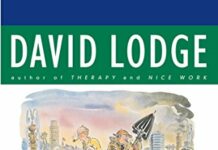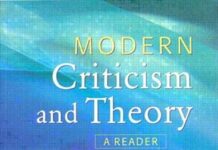
Ebook Info
- Published: 1994
- Number of pages: 256 pages
- Format: PDF
- File Size: 3.87 MB
- Authors: David Lodge
Description
The articles with which David Lodge entertained and enlightened readers of the Independent on Sunday and The Washington Post are now revised, expanded and collected together in book form.The art of fiction is considered under a wide range of headings, such as the Intrusive Author, Suspense, the Epistolary Novel, Time-shift, Magical Realism and Symbolism, and each topic is illustrated by a passage or two taken from classic or modern fiction. Drawing on writers as diverse as Henry James and Martin Amis, Jane Austen and Fay Weldon and Henry Fielding and James Joyce, David Lodge makes accessible to the general reader the richness and variety of British and American fiction. Technical terms, such as Interior Monologue, Metafiction, Intertextuality and the Unreliable Narrator, are lucidly explained and their application demonstrated.Bringing to criticism the verve and humour of his own novels, David Lodge has provided essential reading for students of literature, aspirant writers, and anyone who wishes to understand how literature works.
User’s Reviews
Editorial Reviews: About the Author David Lodge is the author of twelve novels and a novella, including the Booker Prize finalists Small World and Nice Work. He is also the author of many works of literary criticism, including The Art of Fiction and Consciousness and the Novel.
Reviews from Amazon users which were colected at the time this book was published on the website:
⭐Focused on some of the classics, but I was more interested in in modern novel writing
⭐In this book David Dodge explains the artistic features of the novel that even I, a novas, could understand. During his life he has been both a writer of novels and a university professor of writing so he has an excellent understanding of the subject. The book is a collection of weekly newspaper articles that the he wrote several years ago. I enjoyed and benefited from reading it.
⭐This is deeply insightful and the real thing as far as the art of fiction goes. I found it personally engaging as a reader, teacher and as a writer myself. The writer’s life, as they say, is a solitary one (not a lonely one) and David Lodge is brilliant company to have as one thinks about issues in writing, and about the art of fiction in general.
⭐David Lodge keeps what might sound like a dry-as-dust academic subject lively and thoroughly informative. Short chapters, each with a sample from a recognized writer, cover a wide range of approaches for both the would-be writer as well as the armchair reader.
⭐Lodge is an excellent writer and I was happy to find this book on your site.
⭐David Lodge, as a successful novelist, lays out many important principles here. There are many books with this same title, and many of them, including this one, are useful.
⭐Written by an expert whose knowledge of his subject is superb. This knowledge is imparted in a very literary style , enjoyable, interesting and informative to read.
⭐Whether you are just a reader or an aspiring writer, this collection of short stories is well worth the read. Get into its pages and explore.
⭐The Art of Fiction by David Lodge is a great little book covering 50 literary devices, such as Suspense, Point of View, Stream of Consciousness, Time-Shift, Repetition and Magic Realist. It is a very good learning resource for students and the general reader alike, as it informs them how writers use their craft to create the works they do. Lodge is very knowledgeable: he writes clearly and well—and never obscures the reader with complexities. Everything is understandable in this book. It is a little gem. Five stars. I hope you find my review helpful.
⭐Lodge explores fifty different fictional devices, ranging from the unreliable narrator to time shifts, from exposition to the weather. Each device in its own self contained chapter, which starts with a short novel extract or two exemplifying the use of that device and then Lodge’s analysis of it. He will also refer to other relevant examples throughout Western literature.For the most part, this is an absolutely fantastic book, engaging and readable yet clearly deep in scholarship. I feel this explains so much of what I’ve read over the years, so I would recommend this book to someone with both the experience of and passion for literature; someone just starting out on their journey would possibly lack the frames of references for a lot of what David Lodge talks about. I am an English teacher myself and have already been inspired in my own writing and teaching.I’ve knocked off a star because I feel Lodge loses his way in a few chapters, and his analysis of his own extracts is not as incisive as it could be. Nevertheless, since the book is organised into bitesize chapters, you never come away feeling disappointed, but eager instead to see how the next one goes.
⭐David Lodge covers 50 writing topics in 50 chapters. Each chapter can be read by itself without reference to the other chapters, which I found made it readable and digestible. One of this book’s best features is the wide range of writing that goes back to Laurence Sterne and Henry Fielding who both wrote in the Eighteenth Century to more modern writers including himself. I thoroughly enjoyed his selection which covered a vast range of styles and topics. I also found most of his comments interesting and helpful.The main message seemed to be that the only absolute rule about good creative writing is that there are no rules. And if there are any rules, it’s acceptable for established writers to break them. For example, very long sentences and multiple repetitions are discouraged in young writers, but fine for people who know what they’re doing.Occasionally I disagreed with his conclusions, Once or twice he appeared to read more into the text that the author might have intended – particularly with regard to the extract from Ernest Hemingway (he might of course be right but he came across as being slightly too adulatory to the great man).Apart from that minor criticism, I really liked The Art of Fiction (which was recommended to me by my Open University tutor). It gave plenty of new literary insights and explained some literary devices with which I was not previously familiar. On the whole, this book is a useful resource for students of English Literature and Creative Writing.
⭐This work starts slowly, but gets better and better as it progresses and lodge gets into his stride. Good on the theory of the craft of writing, but does not really offer much practical advice.
⭐David Lodge writes in a low key amusing style which makes these essays on fiction entertaining reading. The book contains fifty essays which examine all aspects of fiction including magic realism, point of view, chapters, surrealism, irony and the weather. His thoughts are illustrated with quotations from all types of fiction from the eighteenth to the twenty first century. He also shows how he has used various techniques in his own novels.Reading this book helps the reader to understand how authors achieve their effects and increases future enjoyment when reading novels. Some of the novels quoted may be new to many readers and will provide new avenues to explore. If you thought literary criticism and analysis would make for dull reading then give this book a try – it could change your mind.
Keywords
Free Download The Art of Fiction: Illustrated from Classic and Modern Texts in PDF format
The Art of Fiction: Illustrated from Classic and Modern Texts PDF Free Download
Download The Art of Fiction: Illustrated from Classic and Modern Texts 1994 PDF Free
The Art of Fiction: Illustrated from Classic and Modern Texts 1994 PDF Free Download
Download The Art of Fiction: Illustrated from Classic and Modern Texts PDF
Free Download Ebook The Art of Fiction: Illustrated from Classic and Modern Texts

